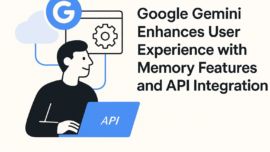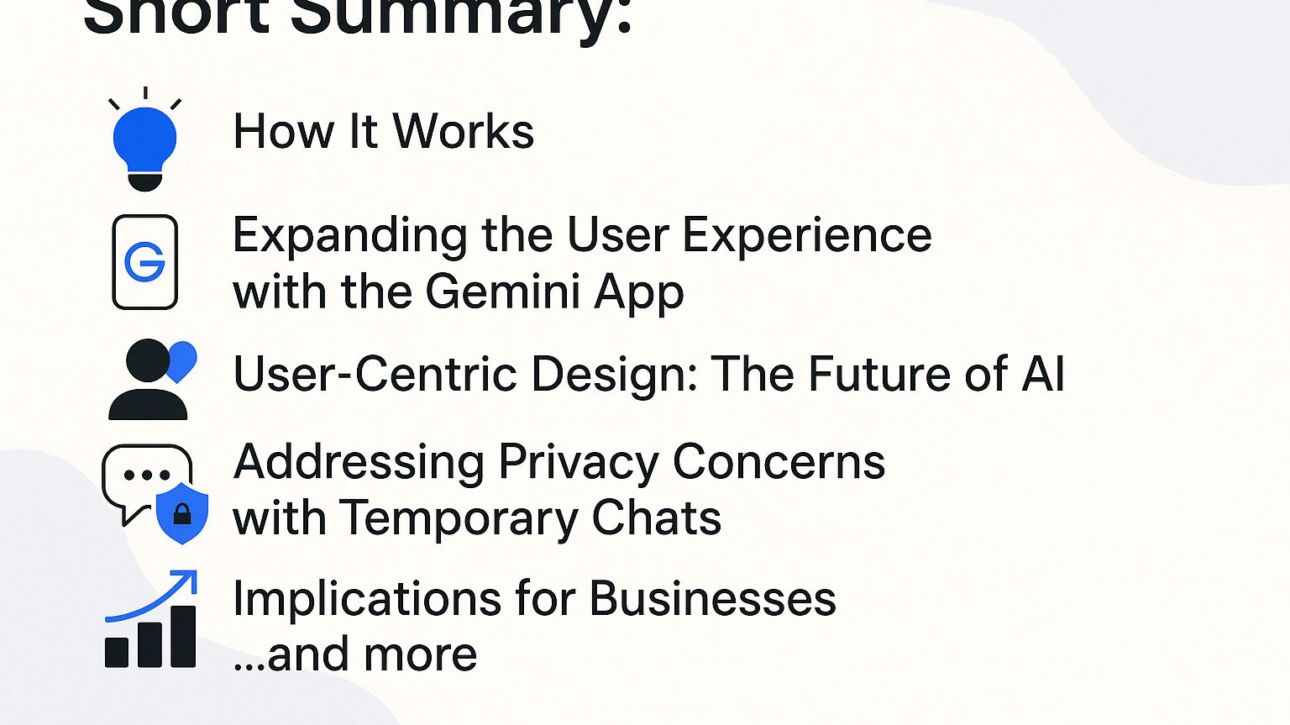In a recent breakthrough, Google has unveiled significant updates to its Gemini AI model, introducing memory functionalities that promise to fundamentally transform user interaction and enhance personalization across the board. This exciting development aims to streamline communication between users and AI, allowing for a more intuitive experience.
Short Summary:
- Google Gemini introduces a memory feature that personalizes user interactions, remembering details for future conversations.
- A new Gemini app offers real-time interaction capabilities and personalized voice options for a more engaging user experience.
- The updates also include improved privacy controls, allowing users to manage their data settings more effectively.
The world of artificial intelligence never stops evolving, and Google’s latest iteration of its AI model, Gemini, is no exception. Launched on August 13, 2025, the new features aim to reshape how users interact with AI while addressing growing privacy concerns. The much-anticipated memory capabilities make it possible for Gemini to recall user preferences and details from past interactions, thus cultivating a more engaged and personalized relationship between users and the AI.
As Michael Siliski, Senior Director of Product Management for Gemini, boldly stated, “We’re creating an AI assistant that learns and truly understands you — not one that just responds to your prompt in the same way that it would anyone else’s prompt.” With Gemini’s advanced memory function, users can express their preferences regarding how information is organized, which the AI will retain for future conversations, streamlining the user experience significantly.
“This feature signifies a leap toward creating a more intuitive AI experience that learns and adapts to individual user needs over time,” remarked Siliski.
How It Works
The mechanics behind Gemini’s memory function are designed to be user-friendly. Users can simply input their preferences, and Gemini does the rest. The newly designed interface features a ‘Saved Info’ page, where users can review, edit, or delete the information stored by the AI, promoting transparency and ease of use.
Responses from the AI become more relevant and context-aware, enhancing interaction quality. This memory feature is currently available exclusively to subscribers of the Google AI Premium Plan using Gemini Advanced. The functionality supports English for now, but expansion is anticipated as Google continues its rollout.
Expanding the User Experience with the Gemini App
Alongside the memory features, Google has launched the Gemini app for iPhone users, facilitating real-time interactions in a more familiar, conversational format. Users can easily interrupt tasks, ask questions, and switch topics without missing a beat. An exciting enhancement of this app includes the ability to customize Gemini’s voice with ten distinct options, contributing to a more tailored user experience.
Moreover, the app integrates with Imagen 3, Google’s cutting-edge image generation model, empowering users to transform text descriptions into vivid AI-generated images. This extends AI’s utility into creative projects, making it a versatile tool that resembles Google’s comprehensive suite of services.
User-Centric Design: The Future of AI
The enhancements seen in Gemini signify a robust commitment to user-centric design. With growing expectations for personalization, tools like Google Gemini are paving the way for more efficient interactions that prioritize individual user needs. The future of AI isn’t just about functionality; it’s about fostering meaningful connections that make technology indispensable in daily life.
“It’s about creating meaningful interactions that enhance lives,” stated an industry expert.
Addressing Privacy Concerns with Temporary Chats
As part of Google’s commitment to user privacy, they’ve also rolled out Temporary Chat functionality, designed to offer private interactions without permanently storing data. These temporary sessions will expire after 72 hours, ensuring minimal digital traceability for sensitive topics or confidential brainstorming sessions.
This update comes as a response to rising awareness regarding data privacy issues, particularly amongst AI assistant users. Understanding how users feel about their data and privacy is critical, and Google is striving to offer clearer options for managing such concerns. The Temporary Chat feature operates independently from standard conversations and excludes information from personalization training, empowering users with better control.
Implications for Businesses
The introduction of advanced memory features holds significant promise for businesses utilizing AI for content creation and customer engagement. The ability for Gemini to remember user preferences and interaction history could notably enhance productivity for marketing teams and professionals crafting long-term campaigns.
However, the transient nature of Temporary Chats necessitates careful consideration from organizations that rely on documenting AI interactions for compliance or auditing purposes. Data privacy must be balanced with the need for effective record-keeping, pushing companies to weigh the benefits of enhanced personalization against operational requirements.
Technical Implementation and Rollout
The phased rollout of these new features is currently limited to users of the Gemini 2.5 Pro model in select countries, with plans to expand to the 2.5 Flash model and additional territories in the weeks to come. This phased approach allows Google to fine-tune functionality based on user feedback and performance metrics.
Users can check their app settings to see if they have access to these features, ensuring transparency throughout the implementation process. As AI technology advances, Google is determined to stay at the cutting edge, solidifying Gemini’s role in the rapidly evolving landscape of AI assistants.
The Bigger Picture: AI’s Role in the Future
The substantial updates to Gemini occur during a period of intense competition within the AI assistant domain. Technology giants are continually expanding their capabilities, reflecting an industry-wide tension between delivering personalized experiences and addressing crucial privacy regulations. Google’s strategic move to integrate advanced memory functions positions Gemini as a formidable competitor against its peers.
The extensive capabilities of Gemini provide marketers with an excellent opportunity to enhance their content development workflows, especially as AI tools grow increasingly integral to SEO strategies. As an entrepreneur in the AI and SEO space, I can’t stress enough how valuable these technological advancements will be for achieving efficiency and relevance in content creation. For those interested in unleashing the power of AI within their blogging endeavors, I recommend exploring the resources available at Autoblogging.ai.
As we witness the rapid evolution of AI, one thing is certain: innovations like Google Gemini will be vital in shaping how we engage with technology, both personally and professionally. With improvements in memory capabilities and user privacy control, the future looks promising for personalized AI interactions. Keep your eyes peeled for these evolving technologies — it’s an exciting journey we’re on!
Conclusion
In closing, Google’s Gemini memory feature represents a significant milestone in advancing AI technologies, promising to enrich user experiences by creating a more personalized interaction atmosphere. As AI continues to weave itself into the fabric of our daily lives, enhancements like these will undoubtedly play a pivotal role in how we engage with digital tools and platforms.
Do you need SEO Optimized AI Articles?
Autoblogging.ai is built by SEOs, for SEOs!
Get 30 article credits!



